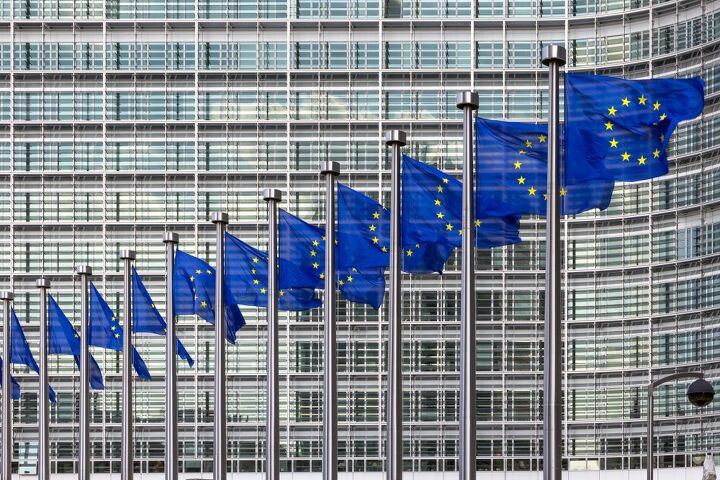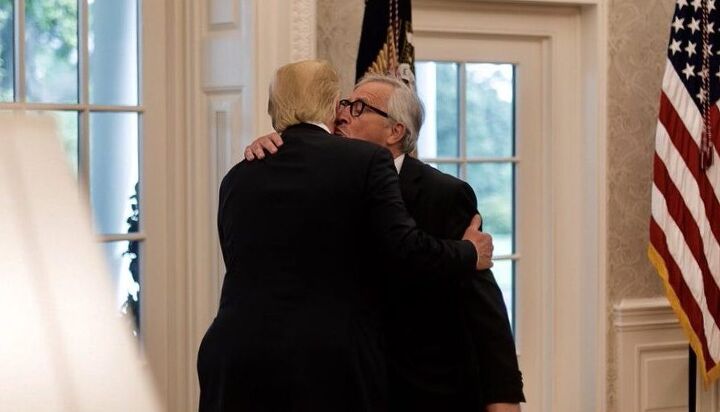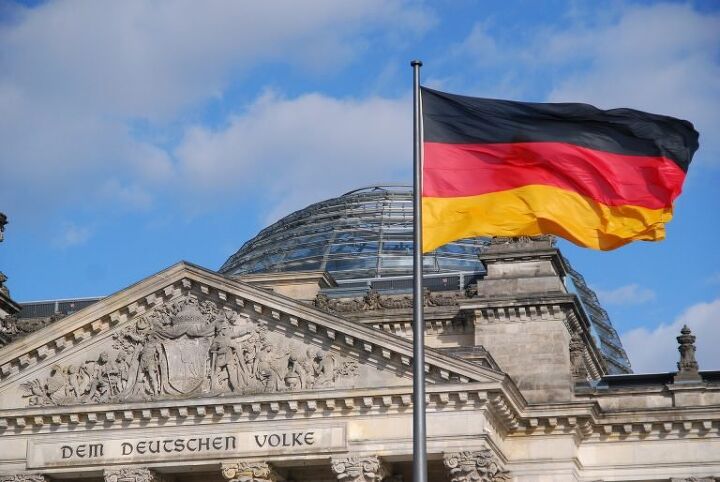#EuropeanCommission
Gas War: Europe Reaches Agreement On 2035 Combustion Ban
The Czech Republic, which currently holds the European Union presidency, has announced that negotiators from member states, the European Parliament, and the European Commission have finally come together to agree upon the often-mentioned combustion ban. By 2035, every automaker operating within the continent will be required to cut emissions by 100 percent – effectively mandating what type of vehicles can be sold there.
Europe Now Requires Speed Regulators for All New Vehicles
On July 6th, the European Union formally introduced laws that require auto manufacturers to install speed-limiting hardware on new vehicles. While speed governors have been around for years (and are becoming increasingly popular among certain manufacturers) the EU’s new rules actually require technology that takes things a step further by allowing cars to actively detect and then regulate the speed for any given road.
Europe Developing 'Battery Passport' for EVs
A group of German automakers, chemical concerns, and battery producers have announced the joint development of a “battery passport” designed to help government regulators trace the history of the cells. The consortium is funded by the German government and is supposed to work in tandem with new battery regulations that are being prepared by the European Union.
According to the German economic ministry, officially the Federal Ministry for Economic Affairs and Climate Action, the overarching plan is for the EU to mandate traceable hardware be installed in all batteries used in the continent by 2026. Those intended for use in electric vehicles are up first, with the passport scheme also serving to chronicle everything from the vehicle’s repair history to where the power cell’s raw materials were sourced.
Europe Proposes Banning Internal Combustion Cars By 2035
Last week, the European Union proposed banning the sale of all new internal combustion vehicles starting in 2035. With several member nations proposing restrictions in the coming years, EU leadership feels it can accelerate the timeline to force electric vehicles as the de facto mode of transportation. The European Commission has suggested making it illegal to sell gas or diesel-powered vehicles in 14 years, with aims to reduce CO2 emissions produced by automobiles by 55 percent (vs 2021 levels) by 2030.
But countries that still produce vehicles have expressed reservations about the scheduling. France absolutely agrees with mandating restrictions that would reduce greenhouse emissions. Though President Emmanuel Macron’s office has been pressing that hybrid vehicles would be able to do much of the heavy lifting and fears that an outright ban of internal combustion could hamstring the industry if conducted too early. Germany, which manufacturers more vehicles than other EU member nations, is of a similar mind.
European Union Empowered to Recall Vehicles Over Emission Violations
Updated rules have granted the European Commission the ability to not only check cars for emissions compliance, but also issue recalls for those found in violation.
Previously, recalls were required to be issued by the EU member nations that initially certified the vehicles. But the European Commission claims this tactic has allowed automakers to easily circumvent regulatory mandates, making large-scale recalls slower to progress for almost a decade. Following Volkswagen’s diesel emissions scandal in 2015, the EU ramped up efforts to consolidate regulatory powers after the United States was the one that initially busted the German automaker for cheating during pollution tests.
The European Commission will now be able to enact recalls on its own authority and fine automakers up to 30,000 euros ($35,725 USD) per vehicle. Those in broad opposition of giving Brussels additional authority have criticized the changes, while those supportive of the EU claim it will be able to deliver environmental justice more swiftly than individual nations.
FCA, PSA to Be Probed Deeply Ahead of Merger
Executives from Fiat Chrysler Automobiles (FCA) and PSA Group are reportedly concerned that their companies are in for an extensive probing by the European Commission before their planned merger can take place. Ideally, the duo have said they want to finalize the deal early in 2021, but the prolonged investigative dive may force them to readjust that timeline.
The European Union has historically been a big fan of antitrust investigations and often tries to predict future business actions to address how newly formed organizations might impact the market overall. It’ll be a difficult task, what with automotive sales suppressed by coronavirus lockdowns and the global economy looking particularly grim.
Few are under the impression that the merger will be blocked, however.
EU Considers $22 Billion Electric Vehicle Stimulus, U.S. Mulls Cash-for-clunkers Redux
The European Commission is reportedly preparing an economic stimulus package aimed at helping the EU bounce back from economic hardships caused by the coronavirus lockdown — saving some room for incentivized electric vehicle sales.
As you may have noticed in your home country, stimulus package proposals often involve lawmakers attempting to slip something in to aid their favorite causes. While not every nation in the EU feels similarly on all matters, environmentalism has been a reoccurring theme within the union — and has encouraged it to make aggressive decisions when it comes to promoting vehicles.
For decades, the European Union spent billions in subsidies and tax breaks to make diesel fuel cheaper than gasoline. Diesel engines produced less carbon dioxide and opened the door to biofuels, so the presumption was they were better for air pollution. That turned out not to be true, so the continent then pushed hard into subsidizing EVs, with diesel sales crumbling as a result.
Now seen as the only way to save the world from heavy, gas guzzling crossovers that people actually buy in great numbers, battery electric cars are getting their moment in the sun. And it may get a little brighter. The next EU stimulus package is set to include €20 billion ($22 billion USD) for those deciding to purchase an environmentally friendly passenger car.
European Cartel Probe Suspects German Automakers of Illegal Agreements
While Europe appears infinitely suspicious of German automakers, it hasn’t been nearly as eager to cuff suspects and cart them off to the slammer. Considering how unappealing Japan’s treatment of a former Nissan employee happened to be with the general public (regardless of his guilt/innocence), that’s probably wise. Slow and sure is the ideal strategy for tackling corporate corruption — it just has the unfortunate consequence of dragging everything out.
In 2018, BMW, Daimler, and Volkswagen Group became the focus of an investigation aimed at uncovering illegal cooperation. Allegations going back to 2017 stipulated the three had coordinated on the rollout of clean emissions technology (specifically AdBlue); at the same time, Germany was under heavy scrutiny for the leeway it was giving automakers after VW’s diesel emission scandal. Before long, claims arose that Germany’s manufacturers had been effectively running an automotive cartel for decades, with supporting evidence slowly mounting.
Trade War Watch: Automotive Tariffs and the European Union
It’s been nearly a year since President Donald Trump and European Commission President Jean-Claude Juncker kissed and negotiated a temporary truce aimed at buying the United States and the EU time to renegotiate their positions without fear of new tariffs.
Unfortunately, it seems everyone had better things to do following the smooch.
EU Faults BMW, Daimler, Volkswagen With Emissions Collusion
It might have taken two years of investigative raids and Daimler acting as a whistleblower, but Germany’s Big Three automakers finally stand accused by the European Union of collusion. On Friday, the European Commission claimed that Volkswagen Group, BMW and Daimler broke antitrust rules by acting together to delay the introduction of two emission cleaning systems between 2006 and 2014.
The Commission’s preliminary view is that BMW, Daimler and VW participated in a collusive scheme, breaching the EU’s competition rules by limiting the development and proliferation of new emission cleaning technology for diesel and gasoline-fueled passenger cars sold in the “European Economic Area.” This collusion occurred in the framework of the car manufacturers’ so-called “circle of five” technical meetings — which includes VW Group’s Porsche and Audi.
Fiat Chrysler, JLR, Renault, Nissan, PSA Under Possible Antitrust Investigation
The European Commission is said to be investigating several automotive companies over possible antitrust violations relating to the sale of auto parts. According to Germany’s Der Spiegel, Renault, Nissan, PSA, Jaguar Land Rover and Fiat Chrysler Automobiles have all been placed under government scrutiny for possible price fixing. The report claims the manufacturers may have colluded to elevate the value of certain auto parts by as much as 25 percent.
Assuming the report is accurate, that would make this the EU’s second major automotive cartel investigation in the last two years.
EU Launches Emissions Collusion Investigation Against German Automakers
Roughly one year ago, German automakers were confronted with a crisis. Following Volkswagen’s diesel emissions fiasco, European antitrust regulators became suspicious that BMW, Daimler, and VW Group were involved in a longstanding automotive cartel that cooperated on decisions regarding technical issues, development, supplier management, and illegal price fixing. Investigators were also concerned manufacturers worked together to standardize diesel treatment fluid (AdBlue) reservoirs to reduce exhaust emissions, then encouraged each other to cheat on emissions tests when they were deemed insufficient.
This resulted in a series of raids and then almost a full year of silence on the matter. However, if Volkswagen’s dieselgate has taught us anything, it’s that German authorities prefer a snail’s pace when pursuing a criminal probe.
Apparently unsatisfied with the initial findings, the European Commission opened an in-depth and official investigation on Tuesday against the “circle of five,” a group that includes Audi, VW, Porsche, Daimler, and BMW. The quintet is accused of holding meetings where they colluded to limit the development and application of certain emissions control systems for cars sold in Europe. There’s also an accusation of price fixing.
Environmentalists Says Euro MPG & Emissions Testing Allows Gaming By Automakers
The prevailing narrative seems to be that the United States lags behind Europe in addressing issues like fuel economy and emissions. U.S. regulatory standards are seen as not as rigorous as those used in the European Union. Cars sold in the European market get better gas/diesel mileage and put out less supposedly harmful carbon dioxide and other products of combustion. Now, the Economist is reporting that an environmental group is claiming that the Euro standards are a bit of a sham because the system in Europe allows automakers to game the testing procedures, resulting in poorer real-world performance than that indicated by testing.
EU Orders Germany To Cease Use Of R134a Within Two Months
After months of investigation regarding the German government’s support of Daimler’s continued use of R134a — in violation of a law mandating use of refrigerants “with a global warming potential no more than 150 times that of carbon dioxide” — the European Commission has given Germany two months to comply with the law, or be fined and taken to court.
European Automakers Claimed To Use Testing Loopholes In Emissions Compliance
Though the European Environment Agency proclaimed new cars sold throughout the European Union in 2013 as being 4 percent cleaner than those sold in 2012, an environmentalist group says testing loopholes are the cause behind the results.






























Recent Comments